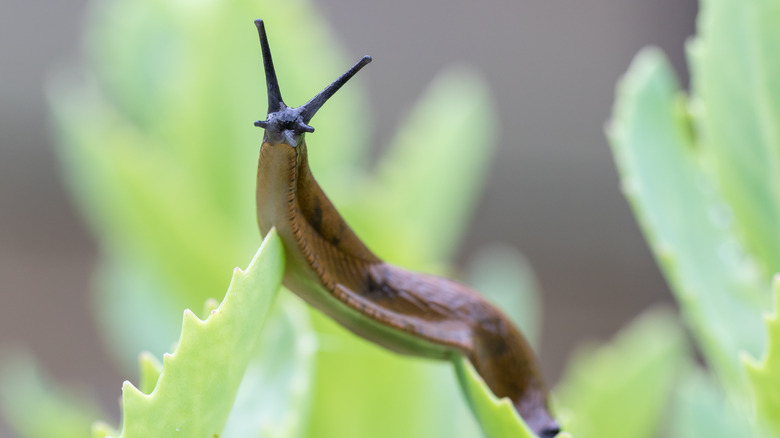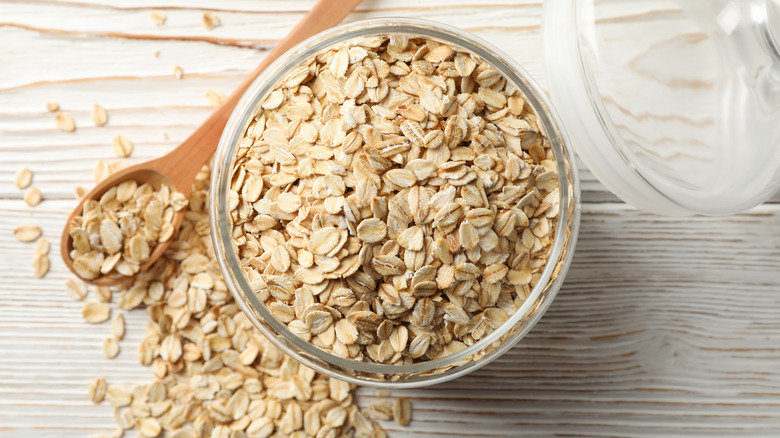The Common Breakfast Food That Will Help You Control Slugs In Your Garden
Garden slugs are hardy creatures that are fascinating to watch, but they present an irritating problem for gardeners. If they aren't controlled quickly, these invertebrates will chew holes in your leaves, munch on fruits and vegetables, and leave slimy trails all over your garden. They can ruin crops of sensitive greens like lettuce, broccoli, and strawberries in a matter of days (via Oregon State University). It's important to nip them in the bud early to protect your garden. But slugs aren't just an unsightly problem; they can also be dangerous for your health. Garden slugs can be carriers for dozens of parasites, including rat lungworm, which can be transmitted to dogs and humans and cause paralysis and death (via National Geographic).
Whether you grow rows of fresh produce or a few ornamental flowers, garden slugs are no joking matter. Reducing soil moisture and removing weeds can help to control the slug population, but dry conditions might also threaten your plants. If you've got a true infestation, you need something that will eliminate the slimy critters quickly. Here's how you can serve a sneaky breakfast to the slugs in your garden.
Oatmeal is a non-toxic solution
One of the easiest ways to reduce slugs in your garden is to make an oatmeal trap. This simple breakfast food has a sweet, grainy scent that will attract slugs from all over your garden. To make your trap, simply pour about a cup of plain and dry instant oatmeal into a disposable container, such as an old tuna can, soup can, or aluminum baking pan. Depending on the size of your garden and the extent of your infestation, you may need to set more than one slug trap or opt for larger containers. Alternatively, you can lightly sprinkle dried oatmeal around the base of your shady plants, but beware that the oats may swell and become sticky if they get wet.
Garden snails and slugs won't be able to resist the sweet scent from your oatmeal trap, and they'll happily chow down on what will turn out to be their last meal. Garden of Eden Garden Center explains that the dry oats will start to swell inside the slugs' stomachs after they eat them, causing them to die rather quickly. Check your traps daily to replenish the oatmeal and remove any victims. Slug Help warns that slugs are cannibals, so the smell of a decaying slug could invite more unwanted guests from all around the neighborhood.
Maximizing your oatmeal's effectiveness
Speaking of handy breakfast food hacks, slugs are attracted to citrus, too (via Garden Gate Magazine)! After squeezing yourself a glass of fresh orange juice, leave the leftover orange rinds near your oatmeal containers. Placement is another key component for getting your oatmeal traps to work, so try to leave oatmeal and orange peels wherever you notice slugs are congregating. Slugs usually avoid the sun, so shady, moist spots under bushes and near your house's foundation are ideal places to set traps.
Timing is also crucial. According to the University of Minnesota, slugs tend to be most active when the weather is cool and damp, so placing your traps overnight or after heavy rain may yield better results. It's a good idea to keep traps up and running throughout peak gardening seasons, especially in the fall, when mature slugs come out to breed and lay eggs (via Oregon State University). Any eggs laid in the fall will hatch in spring, so being proactive with your oatmeal traps can help prevent new generations of garden slugs.


